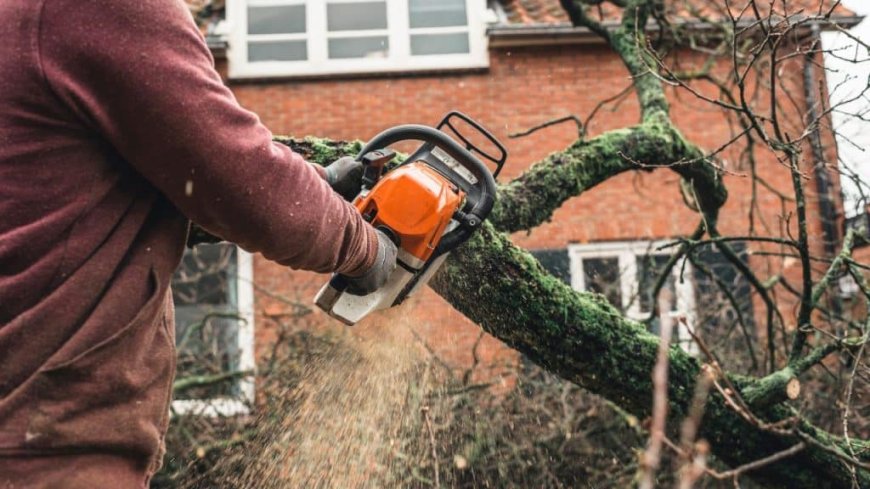Emergency Tree Removal: What You Need to Know When Disaster Strikes
Emergency tree removal isn’t just about cleaning up a mess — it’s about restoring safety and peace of mind. Whether it’s after a storm or due to decay, knowing what to do and who to call can make all the difference. Always put safety first, act quickly, and trust the pros to handle the heavy lifting.

When a tree crashes down unexpectedly on your house, car, or across the road its not just an inconvenience. Its a full-blown emergency. Acting fast can save lives, reduce property damage, and restore safety. Thats where emergency tree removal comes in.
Common Emergency Scenarios
From violent storms to root rot and soil erosion, trees can fail for many reasons. And when they do, it usually happens fast leaving you with zero time to waste.
What Qualifies as a Tree Emergency?
Storm Damage
High winds, lightning, and heavy snow can snap branches or topple entire trees overnight.
Fallen Trees Blocking Roads or Driveways
If a tree is blocking access to or from your home or neighborhood, its an emergency.
Trees Leaning on Structures or Power Lines
This is dangerous trees touching power lines can cause fires or outages. And a tree leaning on your home can collapse the roof.
Diseased or Dead Trees Posing Imminent Risk
Trees that look off might already be structurally compromised. If it looks like it's going to fall, it probably will.
Dangers of Delaying Emergency Tree Removal
Property Damage
Waiting to remove a hazardous tree can result in thousands of dollars in damage to your roof, windows, fences, or vehicles.
Personal Injury Risks
Falling branches and collapsing trees are serious threats to people and pets.
Legal Liabilities
If a tree on your property damages your neighbors home, you could be legally responsible. Ouch.
Signs You Need Emergency Tree Removal
Cracked or Splitting Tree Trunks
This indicates the tree is structurally unstable and can break apart at any moment.
Sudden Leaning
A tree that suddenly starts tilting especially after heavy rain is a red flag.
Exposed Roots or Soil Uplift
When the ground around a tree shifts, it means the roots are no longer anchored.
Broken Branches Hanging Over Property
These can fall with the next gust of wind, causing serious damage or injury.
What to Do When a Tree Falls
Stay Calm and Assess the Area
First, dont panic. Check for injuries and evaluate the extent of the damage.
Keep Your Distance
Avoid going near the fallen tree especially if its near electrical wires or seems unstable.
Contact Emergency Services if Necessary
If theres fire, trapped people, or exposed wires, call 911 immediately.
Call a Professional Tree Removal Company
Search for a 24/7 emergency tree service that can respond quickly and safely.
The Emergency Tree Removal Process
On-site Inspection and Risk Assessment
The crew will evaluate the scene to figure out the safest removal method.
Securing the Area
They may block off roads or secure structures to prevent further damage.
Tree Cutting and Removal
Using specialized equipment, theyll dismantle the tree piece by piece.
Cleanup and Disposal
A reputable service wont leave you with a mess theyll haul everything away.
DIY vs. Hiring Professionals
Why Emergency Removal is Not a DIY Job
Emergency tree removal involves serious risks from heights and heavy limbs to power lines and chainsaws. Dont do it yourself.
Benefits of Hiring Certified Arborists
They have the training, tools, and insurance to handle the job quickly and safely without making things worse.
Equipment Used in Emergency Tree Removal
Chainsaws and Rigging Tools
For precise cutting and lowering limbs safely.
Cranes and Bucket Trucks
Essential for tall or hard-to-reach trees.
Safety Gear
Hard hats, harnesses, gloves, and goggles are must-haves.
Costs Involved in Emergency Tree Removal
Factors That Affect Pricing
-
Tree size and location
-
Complexity of the job
-
Time of day or weekend rates
-
Urgency (same-day response = higher cost)
Average Cost Range
-
Small tree: $300$600
-
Medium tree: $600$1,200
-
Large or complex tree: $1,500$3,000+
Does Insurance Cover Tree Removal?
Sometimes. If the tree damaged your home or blocked your driveway, your homeowners insurance may cover it. Check your policy or call your agent.
Choosing the Right Emergency Tree Service
24/7 Availability
You need a team that answers the phone at 3 AM during a storm not just during business hours.
Licensed and Insured
This protects you from liability in case of injury or property damage during the removal.
Local Experience and Reputation
Choose a company familiar with your areas trees and climate, with solid reviews and credentials.
Preventing Future Tree Emergencies
Regular Tree Inspections
Hire a certified arborist to inspect your trees once a year for early signs of trouble.
Pruning Weak Branches
Keeps trees strong and less prone to wind damage.
Removing Dead or Diseased Trees Early
Don't wait for them to fall on their own they rarely fall in the direction youd like.
Conclusion
Emergency tree removal isnt just about cleaning up a mess its about restoring safety and peace of mind. Whether its after a storm or due to decay, knowing what to do and who to call can make all the difference. Always put safety first, act quickly, and trust the pros to handle the heavy lifting.
FAQs
How quickly can an emergency tree removal team respond?
Most professional services offer 24/7 response and can arrive within 13 hours, depending on location and storm conditions.
What should I do if a tree falls on my house?
Leave the house if its unsafe, call 911 if needed, then contact your insurance company and a licensed tree removal service.
Can I remove a tree that fell in a storm myself?
Not recommended. Its dangerous without proper tools, training, and safety gear.
Will my insurance pay for emergency tree removal?
Possibly, if the fallen tree caused damage to insured structures or blocked access to your home.
What should I look for in a tree removal service?
Choose a 24/7, licensed, insured, and well-reviewed company with experience handling emergency removals.

































